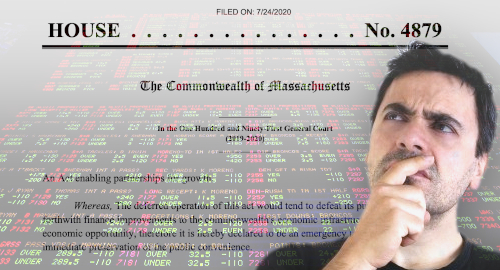 Massachusetts’ sports bettors are one step away from legal online wagering, while the major leagues are one step away from earning a cut of betting proceeds.
Massachusetts’ sports bettors are one step away from legal online wagering, while the major leagues are one step away from earning a cut of betting proceeds.
On Tuesday, the Massachusetts House of Representatives voted 156-3 in favor of Bill H.4879, An Act Enabling Partnerships for Growth. Among other economic opportunities, H.4879 would authorize legal online and land-based sports betting in the state. (View the bill in its entirety here, betting info starts on page 15.)
The bill, which now heads to the state senate for further debate before the current legislative session ends on Friday, envisions three categories of betting licenses: hybrid online/land-based betting for the state’s casino operators; in-person betting for state racetracks; and a ‘Category 3’ license for any Massachusetts-licensed fantasy sports operator that is also licensed for legal sports betting in at least two other US states.
In case anyone’s forgotten, Massachusetts is home turf for DFS-cum-betting monster DraftKings, while Flutter Entertainment’s FanDuel brand also meets those Category 3 criteria. The bill also allows for two additional online-only operators to pursue Cat 3 licenses if they’ve been taking legal wagers in two other states for at least a year (without the need for local DFS operations). In a unique step for US betting legislation, Massachusetts won’t require these operators to partner with a land-based operator to offer online betting.
Companies that meet the criteria for licensing can request a temporary license to start offering betting ASAP provided they submit an initial license fee of $50k. Eventually, they’ll also need to fork over a $250k application fee for a five-year license, which can be renewed for additional five-year periods at $100k per.
Assuming they’re approved, wagering licensees will pay 15% tax on their betting revenue, plus an additional 1% of revenue derived from events at local sports venues. That 1% will be distributed to the operators of those venues “for the purpose of sports wagering security and integrity,” and they’ll have to prove that they spent it on such policies.
The bill is extremely deferential to the major sports leagues, including a requirement for betting operators to license official league data for in-play betting if a league so demands. To date, only Tennessee and Illinois have seen fit to include such mandatory use of league data in their betting legislation.
But Massachusetts goes one giant step further by authorizing the leagues to “enter into commercial agreements” with betting licensees to “share in the amount bet or revenues derived” from wagers placed on a specific league’s games. The section goes on to say that leagues “shall not be required to obtain a license or any other approval” from state regulators to share in this betting bounty.
If approved, this clause would mark the final nail in the major North American leagues’ longstanding hypocrisy on the supposed evils of betting and the irrevocable harm that betting would inflict on game integrity.
The leagues claimed to prize that integrity so highly that they pressed other states to ante up in the form of an ‘integrity fee’ – originally detailed as 1% of betting handle, later reduced to 0.25% – but no state to date has approved such a shakedown. Now it seems the leagues could end up getting their pound of betting flesh after all.